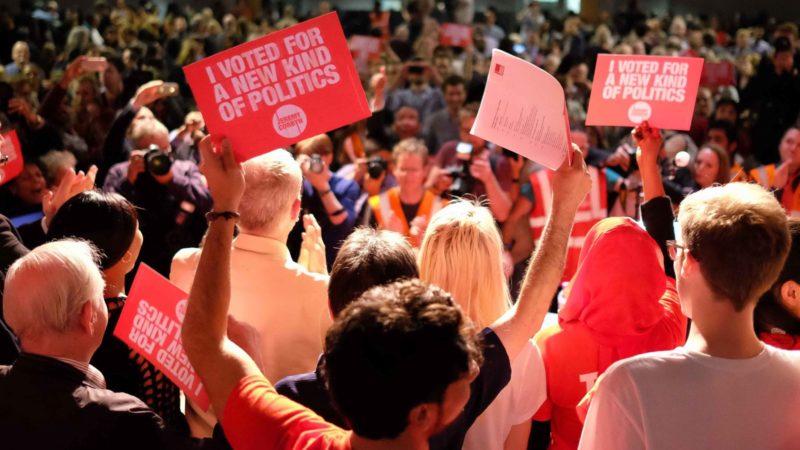
James Schneider, Jeremy Corbyn’s former comms director, has written a book. It is short, lucid, and pleasantly free of the kind of personal hubris and score settling that dogs many books of this kind. Our Bloc is not really a book at all – coming in at a little over a hundred pages, it is essentially a pamphlet. This is not a bad thing; if you, like me, can be found in the pub lamenting the death of the pamphlet then it is truly refreshing to read a work that makes its point clearly and well, without padding, rambling or egotistical digression.
Schneider’s point is this: Britain today is not a place where people are happy with the status quo. We know, he says, that people are aware that workers and tenants get a bad deal; that discrimination against minority communities persists; that the threat of the climate crisis is very real; that people are unhappy with the poverty, the inequality and the profiteering that is rife in contemporary society. There is a desire for change along progressive lines, Schneider insists, and it is the obligation of the left to harness this desire. In the face of this task, “despair is a betrayal”, Schneider says, and the tendency to assert that the British people are inherently conservative (be that big or small C) is little more than leftist group cope.
To change Britain, we must build a bloc – recognise common interest in the work being done by unions, by disability campaigns, by tenants’ rights organisations, by Extinction Rebellion and BLM, by a plethora of groups whose struggles interconnect. It is, he asserts, about recognising commonality. The book also puts forward some pleasantly viable actions that could be taken immediately to strengthen these forces such as, for example, a unionisation drive amongst Labour Party members, a shocking two-thirds of whom are not trade union members. Schneider’s ideas about political education that would pair campaigning with theoretical concepts are also simple and worthwhile.
Schneider is admirably open throughout about the influences on his political thinking, referencing the likes of among others: Chantal Mouffe, Ernesto Laclau, Stuart Hall, Leo Panitch and Ralph Miliband. He presents an unsurprising but coherent set of left thinkers and deploys ideas about movement populism and learning from one’s opposition deftly in his own arguments. A lot of people do not have clear understanding of the intellectual grounding of their own positions, or if they do, they can be somewhat cagey about them; Schneider’s fluency in and embrace of his own tradition is refreshing and informative.
Many people will read this book, however, not for Schneider’s opinions on Chantal Mouffe but for the insight he might bring as a co-founder of Momentum and a long time senior aide to Corbyn during his time as Labour leader. Those looking for insider scoops will be disappointed. Schneider is reasonably limited in his comments on the state of the Labour Party and his time at the top, and there are no recriminations along the ‘if only they’d done what I said’ line. He is not a fan of Keir Starmer, whose politics he describes as being a “void”; he decries, as many do, the Labour right’s poverty of ideas.
But his main thoughts on Labour, both under Corbyn and otherwise, is that “parliament is not where our movements are strongest, most dynamic, or most advanced”. One of the strengths of the left bloc, he feels, is its separation from Labour, which would enable it to take in other unaffiliated organisations – the Baker’s Union, for example. He feels unions should withdraw discretionary funds from the Labour Party to diversify activities and, unsurprisingly, voices his support for Labour’s community organising unit (even speaking as someone who thinks it was a net positive, Schneider perhaps somewhat over-eggs the case for the short-lived unit’s empirical successes).
If Schneider’s bloc-building approach is broadly one I am in favour of, my main criticism of the book would be that the author often elides sincere political difference between parts of the left – putative strands of his bloc – on not just strategy but on the issues themselves. I do not know whether Labour should have backed a second EU referendum in 2019 (I didn’t think so, but there is plenty to suggest it was the best of a series of bad positions available to the party at the time) but the motivations that saw it do so, backed by many elements on the left as well as the right of the party, were more than what Schneider characterises as “pearl clutching by the liberal establishment”. He talks, fairly cursorily, about the fact that “a degree of friction is inevitable” in such coalition building, while burying ideological ledes likely to cause exactly this kind of friction in his own narratives of recent events.
The book concludes with four possible visions of the 2020s in British politics and society, all of which seem alarmingly viable, that serve to highlight the malleability of the near-term future. We have a world to win, but politics is not a zero sum game; Schneider’s diffuse, movement based approach to effecting change shows many gains and opportunities and half victories that seem more at hand than they did before I picked up Our Bloc. There is nothing revolutionary in Schneider’s book, but it is short and well written and makes for smart, bracing reading for anyone looking for tips on where we go from here.




More from LabourList
‘Labour’s quiet quest for democratic renewal’
‘Labour promised to make work pay. Now it must deliver for young people’
‘Council Tax shouldn’t punish those who have the least or those we owe the most’